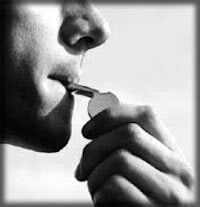Whistle-blower
What's the meaning of the phrase 'Whistle-blower'?
A person who tries to raise the alarm about a problem and publicizes it inside and/or outside of his/her organization.
What's the origin of the phrase 'Whistle-blower'?
 If the number of phrases that make direct reference to whistles is anything to go by, whistling looms large in the consciousness of the English-speaking peoples. Examples are:
If the number of phrases that make direct reference to whistles is anything to go by, whistling looms large in the consciousness of the English-speaking peoples. Examples are:
As clean as a whistle
Bells and whistles
Dog-whistle politics
Not just whistling Dixie
Pig and Whistle
Wet one's whistle
Whistle and flute
Whistle down the wind
Whistling in a graveyard
Wolf whistle
You can whistle for it
Similar activities, for instance humming, produce a much shorter list.
'Whistle-blowers' are people who attempt to draw their superiors' attention to something they believe to be wrong and, if they fail in that attempt and if they feel strongly enough about the matter, go public. Such folk may have been around for a long time but it is only recently that they have been given a name.
The expression 'whistle blower' was used literally well before it gained its current figurative meaning. Lots of people blew whistles; hunters were said to 'whistle down the wind' when they let their falcons loose to fly. Sailors, when needing a wind to free a becalmed ship, would 'whistle for it'. The first profession to be labelled as 'whistle blowers' were the US police, who blew whistles to attract attention to wrongdoing. An early example comes from the newspaper The Janesville Gazette, June 1883, in a story about a policeman who woke half the town in order to forestall a riot:
Quiet was restored upon the arrival of the regular police force, and ere the town clock had struck the midnight hour all had returned to their homes. But the crowd of people were all willing to bet that McGinley was the champion whistle blower in America.
More recently, football referees have also been called 'whistle blowers'.
The association with the blowing of whistles and the drawing of attention to a misdemeanour has now been extended into figurative use. The new use of the expression began in the 1960s and the earliest examples of its use are found in journalistic reports of the My Lai massacre in the Vietnam War, in which several hundred civilians were murdered. Such a report, which was made at the stage that newspapers were still reporting My Lai as an 'incident' and 'alleged massacre', was printed in the Lawton Constitutional, December 1969. This dismissed Ronald Ridenhour, the GI that brought the story to the public's attention, as a fortune hunter with a vested interest:
This "whistle-blower" has turned out to be a clever member of the anti-war faction which has been using the alleged misconduct of a few GIs to slander the American Army.
In the 19th century we had 'whistle blowers', in the 20th we had 'whistle-blowers' and now we have 'whistleblowers'. This changing of an expression into a word, with the intervening hyphenated phase, is one of the most common ways we form new words. There are many examples, from Shakespeare's coinages 'birthplace', 'bloodstained' and 'barefaced' (using just the Bs), to more modern-day examples like 'beancounter' and 'bombshell' (and how long before 'modern-day' becomes 'modernday'?).
Search engines seem to have caught on to this mutation of phrases into words very quickly. A Google image search for "whistle blower" brings up pictures of people blowing whistles. A search for "whistleblower" retrieves pictures of Bradley (a.k.a. Chelsea) Manning.

